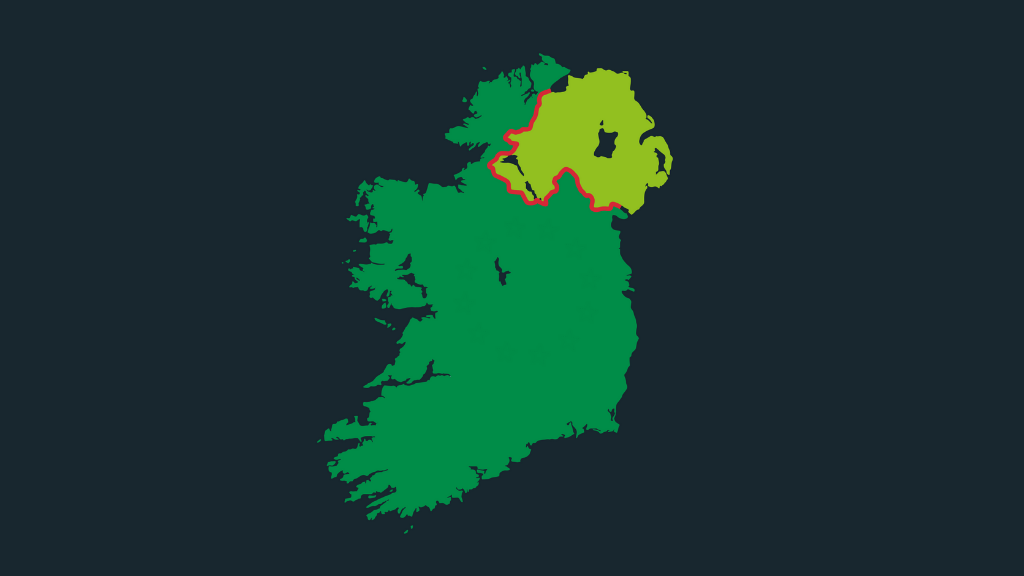Dr Charlie Larkin is Director of Research in the Institute for Policy Research (IPR) at the University of Bath.
To understand the current strategy for the 2019 General Election, you need to think about Sinn Féin and understand the origins of the abstentionist policy in Westminster.
The Sinn Féin party has had a policy of abstention from Westminster dating back to 1919. The loyalty oath to the monarch is considered repugnant to Irish republicanism. The formation of the first Dáil Éireann in January 1919 followed the decision of the Sinn Féin party to not take their seats in Westminster and form an independent legislative body. The 1922 Treaty and the Government of Ireland Act continued to require an oath of allegiance, which in the 26 counties of Ireland set off a civil war and the formation of the Fianna Fáil party of Eamon de Valera. The Troubles in Northern Ireland, recently treated by the BBC series Spotlight on the Troubles, gave rise to the Provisional Irish Republican Army and its political wing, Sinn Féin. This reincarnation of Sinn Féin adopted many of the ideas of the pre-1922 Sinn Féin, one of which was abstentionism on the grounds of the oath.
So why does this matter at the moment?
Largely due to the mathematics of the Tory government. While Sinn Féin (party of Gerry Adams, Catholic nationalist party, now led by Mary Lou McDonald) held seven empty seats, it inadvertently boosted the power of the Democratic Unionist Party (DUP) (party of Rev. Ian Paisley, Protestant unionist party, now led by Arlene Foster), which held 10 seats and provided an essential buttress to the Tory government.
In the 2016 referendum, Northern Ireland voted to remain in the European Union. The DUP, the dominant leave party in Northern Ireland at the time, became the key holder for No.10 with the balance of seats needed for a majority. The UUP, the other major unionist party (Protestant unionist party, the party of David Trimble) has oscillated between remain and leave, reflecting the divided nature of Northern Unionism.
SDLP (the party of John Hume, Catholic nationalist party, now led by Colum Eastwood), Alliance (non-sectarian, non-aligned, led Naomi Long) and the Green Party (non-sectarian, non-aligned, led by Clare Bailey) are pushing to obtain seats in formerly Sinn Féin constituencies in order to provide essential remain seats in the House of Commons. Since 2017 there have been no Northern Irish nationalists in the House of Commons.
The seat contested by Colum Eastwood in Foyle is a very important seat, as it is held by Sinn Féin but with a margin of less than 200 votes. This was previously the seat held by John Hume and therefore has an important symbolic value to the SDLP. The SDLP is also in the process of repositioning itself on an all-island basis. While Sinn Féin holds 23 seats out of 158 in Dáil Éireann, the SDLP never ran candidates south of the border. Under the leadership of Colum Eastwood, the SDLP aligned itself with the Fianna Fáil party, which has created complications for the 2019 election. SDLP, traditionally a centre-left party, loosely aligned itself with the Irish Labour party. The nationalist and sectarian aspect of the SDLP made it less supportive and appealing to the UK Labour party. Infamously, many far-left members of the UK Labour Party, including Jeremy Corbyn, supported the nominally Marxist Sinn Féin party during the 1990s.
As a result of these moves, the SDLP has become less coherent as a political movement than in the past with many Belfast-based SDLP members continuing their relationship with Irish Labour, and distancing themselves from Eastwood and Fianna Fáil aligned SDLP members. This split within SDLP has resulted in the Dublin-based human rights solicitor Michael Finucane, the son of murdered solicitor Pat Finucane, running for Sinn Féin in Belfast, with the objective of unseating the DUP’s sitting MP Nigel Dodds.
Many in the SDLP have voiced their disappointment in Finucane choosing to run for Sinn Féin. If he were to win, and it is a very close race in Belfast, he would not take his seat, but the logic is that since Nigel Dodds is a leave supporter and a very vocal DUP MP, the impact would be to remove one leave vote from the Tory benches and send a powerful rebuke to Arlene Foster and the DUP.
The Alliance party has made the greatest strides since 2017. To understand why a non-sectarian that is neither unionist nor nationalist party has excelled, you need to understand the new European identity being created in Northern Ireland.
Former President Mary McAleese framed the issue best:
"The most important protection for the Good Friday principles was obtained in the immediate aftermath of the referendum in Britain in 2016, when the then Taoiseach Enda Kenny secured the agreement of the European Union that if in the future, under the terms of the Good Friday Agreement and under the terms of the Irish constitution, if partition of this island was ended, then Northern Ireland would seamlessly re-enter the European Union."
"This is quite a remarkable re-calibration of the Irish unity debate. It’s a debate which is coming at us and provided for in the Good Friday Agreement. It’s out there, the when of it we do not know but nonetheless, it’s on the horizon, ahead of us. But the re-calibration by that decision of the European Union is, it would be no exaggeration to say, of potentially massive proportions. Particularly given the strength of cross community support in Northern Ireland for remaining in the European Union."
"Now I say potentially because the debate on Irish unity has focused on crude numbers essentially, and it will like all referenda, be won or lost by crude numbers. It has focused on the crude numbers of Catholics/ nationalists over and against Protestants/ unionists. And it has focused on the coming demographic changes which will in a relatively short time, give Northern Catholics a voting majority. And it has, in some quarters, been normatively presented as a righting of old wrongs, a redressing of the past, and indeed there has at times been a really unhealthy focus on the past."
"Now we have this unexpected, but very welcome in many ways, opportunity to uncouple the crude numbers game with very strong elements of win/ lose about it, winners and losers. We have instead now this opportunity to develop a wholly fresh focus on the future, making it a place of transcendence, where multiple identities can be respected, be accommodated, can grow to become one community, gathered around the principles of the Good Friday Agreement and the European Union."
"That is quite a step forward. The impact of it and the import of it is not lost, particularly in Northern Ireland. Clear sighted people can now see that we are navigating, we’ve been nudged off the old trajectory, what I might call the “wrap the green flag around me” trajectory, into a much, much healthier space where our focus is on let’s talk about what a shared future might look like, let’s hear the fears, let’s hear the imagination and creativity we can bring, and what decency we can bring to resolving those fears and those issues. But one of the things we have to learn, is to learn from the Brexit debacle, it’s a very very, sobering lesson.”
“The Good Friday Agreement promised that partition could be ended if the people so decided by referendum, North and South. Someday they will be asked to decide that, and those of us, and I am one of them, who believe that the truest and best potential of this entire island and all its people will only be realised when Northern Ireland and Ireland merge, and emerge as a modern, European democracy, inclusive of all, respectful of all. We have a duty to ensure that the groundwork is laid, is laid well in advance that is not convulsive but that it is convincing."
A shared European identity is forming from centrist voters alienated by the NI Assembly’s stagnation and political polarisation, and by the more internationalised urban dwellers in Belfast. Alliance have been unequivocal about their desire to remain and that the future of Northern Ireland is within this broader European identity, not Irish or British. The Alliance party saw a 21 seat increase in the 2019 local elections with a 4.8% increase in first-preference votes across all of Northern Ireland. Those first-preference votes are essential in a first-past-the-post election like that for a Westminster seat. Will that translate into a dramatic rise Westminster seats? Unlikely, but Naomi Long, the leader of the Alliance Party and recently returned MEP for Northern Ireland, will have a strong possibility of being returned, bringing a powerful remain voice to Westminster.
The calculus of seats in Northern Ireland will be a likely loss of one or two DUP seats facilitating the arrival in Westminster of Northern Irish remain voices from SDLP and Alliance. The abstentionist policy will remain in place and the seven or eight seats likely to go to Sinn Féin will be vacant. If a Tory government requires the DUP it will still have some seats to trade but at what cost is unknown. The DUP are deeply suspicious of the Johnson government now that he placed the border in the Irish Sea. Despite the importance of Westminster, the longer the Assembly remains suspended, the more difficult it will be to maintain peace and stability in Northern Ireland.
This blog is part of the IPR 'General Election 2019' blog series. Visit the IPR blog to read more.
Respond




